Motivation Letter For Phd Application Or Position
[Your Name]
[Your Address]
[City, State, Zip Code]
[Your Email Address]
[Your Phone Number]
[Date]
[Recipient's Name]
[University/Institution Name]
[Department/Institute Name]
[Address]
[City, State, Zip Code]
Dear [Recipient's Name],
I am writing to express my strong interest in pursuing a Ph.D. at [University/Institution Name] in [Department/Field of Study]. As a passionate and dedicated individual with a deep commitment to academic excellence and research, I believe that [University/Institution Name] offers the ideal environment for me to further my intellectual growth and contribute meaningfully to the field of [Your Field of Interest].
My academic journey has been characterized by a strong curiosity and drive to explore the frontiers of knowledge in [Your Field of Interest]. I completed my undergraduate studies in [Your Field of Study] at [Your Undergraduate University], where I consistently ranked among the top students in my cohort. During my undergraduate years, I actively engaged in various research projects, which not only expanded my understanding of the subject but also instilled in me a fascination for research-driven exploration.
Subsequently, I pursued a master's degree in [Your Field of Study] at [Your Graduate University], where I was fortunate to work with esteemed professors on cutting-edge research projects. My master's thesis, titled [Title of Your Master's Thesis], delved into [Briefly describe your research topic and its significance]. This experience further strengthened my research skills, analytical thinking, and ability to work both independently and collaboratively in a team.
Throughout my academic journey, I have been driven by the desire to tackle real-world challenges and make meaningful contributions to society. My passion for research has led me to present my work at several national and international conferences, where I had the opportunity to receive valuable feedback and exchange ideas with fellow researchers. Additionally, I have published two peer-reviewed papers in reputed journals, further solidifying my commitment to contributing to the advancement of knowledge in [Your Field of Interest].
[University/Institution Name] stands out to me due to its exceptional reputation in research and its commitment to fostering a vibrant academic community. The work being conducted by the esteemed faculty members and the state-of-the-art facilities available at [University/Institution Name] align perfectly with my research interests and aspirations. I am particularly excited about the possibility of working under the guidance of Professor [Name], whose research in [Their Research Area] has significantly influenced my own thinking.
Moreover, I am confident that [University/Institution Name] will provide the intellectual freedom and resources necessary for me to explore and push the boundaries of [Your Field of Interest]. The diverse and collaborative research environment at [University/Institution Name] will enable me to engage with scholars from various disciplines, fostering a multidisciplinary approach to problem-solving.
In conclusion, I believe that a Ph.D. program at [University/Institution Name] will be an instrumental step in my academic and professional journey. I am eager to immerse myself in a challenging and stimulating research environment, where I can make valuable contributions and prepare myself to become a competent researcher and academic in the field of [Your Field of Interest].
Thank you for considering my application. I look forward to the opportunity to contribute my skills, passion, and dedication to the research community at [University/Institution Name]. Please find my detailed curriculum vitae and recommendation letters enclosed with this letter.
If there are any additional materials or information needed, please feel free to contact me. I am available at [Your Phone Number] or [Your Email Address].
Sincerely,
[Your Name]
Formal Motivation Letter for PhD Application in [Field]
Subject: Application for PhD Position in [Field]
Dear [Professor/Dr. Name],
I am writing to express my interest in pursuing a PhD in [Field] at [University Name]. With a Master's degree in [Your Degree] from [Your University] and substantial research experience in [Specific Topic], I am eager to contribute to the ongoing projects in your laboratory.
My previous work on [Project/Research Topic] has strengthened my analytical and experimental skills, and I am particularly fascinated by your research on [Professor's Specific Work]. I am confident that my background and passion for [Field] make me a strong candidate for this program.
I would be honored to discuss my application further and provide any additional information required.
Sincerely,
[Your Name]
Creative Motivation Letter for Interdisciplinary PhD Program
Subject: Application for PhD Program in [Interdisciplinary Field]
Dear [Professor/Dr. Name],
I am thrilled to apply for the PhD program in [Interdisciplinary Field] at [University Name]. My academic journey has bridged [Field 1] and [Field 2], and I am fascinated by the potential of combining these disciplines to tackle complex research questions.
Through my previous research on [Topic], I have developed skills in [Techniques/Methods], which I hope to apply in innovative ways within your lab. The prospect of contributing to [Specific Research Initiative] excites me greatly.
Thank you for considering my application. I look forward to the possibility of joining your esteemed team.
Warm regards,
[Your Name]
Heartfelt Motivation Letter for Scholarship-Linked PhD Position
Subject: Motivation for PhD Scholarship in [Field]
Dear [Scholarship Committee/Professor Name],
I am writing to express my strong motivation to pursue a PhD in [Field] under the [Scholarship Name]. This opportunity aligns perfectly with my aspirations to advance research in [Specific Topic] and make meaningful contributions to the academic community.
My academic and research experiences, including [Projects/Publications], have prepared me for the rigor of doctoral studies. I am particularly inspired by [Professor’s Research/Program Goals] and hope to bring my dedication and curiosity to your team.
I would be grateful for your consideration and the chance to contribute to this program.
Sincerely,
[Your Name]
Professional Motivation Letter for PhD Position Post-Work Experience
Subject: Application for PhD in [Field]
Dear [Professor/Dr. Name],
With [X] years of professional experience in [Industry/Research Field], I am eager to advance my academic career by pursuing a PhD in [Field] at [University Name]. My work on [Project/Task] has provided me with practical insights that I am excited to explore further through research.
I am particularly interested in your work on [Professor's Research Focus], and I believe my background uniquely positions me to contribute effectively. I am confident that this program will allow me to merge applied experience with rigorous academic research.
Thank you for considering my application.
Best regards,
[Your Name]
Informal Motivation Letter for Early Career Researcher Position
Subject: Interest in PhD Opportunity in [Field]
Hello [Professor/Dr. Name],
I am excited to apply for the PhD position in [Field] at [University Name]. My recent Master's work on [Topic] sparked my enthusiasm for [Specific Research Area], and I am eager to continue exploring these questions under your guidance.
I enjoy collaborative research and have experience in [Methods/Techniques]. I am particularly drawn to your lab’s focus on [Specific Project or Area] and would love to contribute my skills and energy to the team.
Looking forward to discussing this further!
Best,
[Your Name]
Quick and Concise Motivation Email for PhD Position Inquiry
Subject: Inquiry Regarding PhD Position in [Field]
Dear [Professor/Dr. Name],
I hope this email finds you well. I am interested in applying for a PhD in [Field] at [University Name] and would like to inquire about potential opportunities in your lab.
My background includes [Degree/Experience], and I am particularly motivated by your work on [Topic]. Please let me know if any positions are currently available or if I may submit my application materials for consideration.
Thank you for your time.
Best regards,
[Your Name]
Serious Motivation Letter for Competitive PhD Fellowship
Subject: Application for PhD Fellowship in [Field]
Dear [Fellowship Committee/Professor Name],
I am writing to apply for the PhD fellowship in [Field] at [University Name]. My research focus on [Topic] aligns closely with the fellowship’s objectives of fostering innovative and impactful scientific inquiry.
Through my academic and research experiences, including [Projects/Publications], I have developed a solid foundation in [Methods/Field]. I am committed to contributing rigorously to your program and advancing knowledge in [Specific Area].
Thank you for considering my application.
Sincerely,
[Your Name]
What / Why: Purpose of a PhD Motivation Letter
- Demonstrates your research interests and academic commitment.
- Shows alignment between your background and the program’s focus.
- Provides insight into your motivations, experiences, and long-term goals.
- Serves as a persuasive tool for admission committees or scholarship boards.
Who Should Write a PhD Motivation Letter
- Prospective PhD applicants.
- Candidates seeking research positions or academic fellowships.
- Early-career researchers wanting to demonstrate readiness for doctoral studies.
Whom to Address the Motivation Letter
- Primary supervisor or potential PhD advisor.
- Department head or program coordinator.
- Scholarship or fellowship committees if required.
- Academic institutions or research organizations offering the position.
When to Send a PhD Motivation Letter
- During application for a PhD program.
- When applying for research grants, scholarships, or fellowships.
- When expressing interest in joining a specific research lab or project.
- As part of preliminary inquiries about available PhD positions.
How to Write a Motivation Letter for PhD
- Start with a clear statement of purpose and enthusiasm.
- Highlight academic background, research experience, and achievements.
- Connect your interests to the research focus of the program or lab.
- Demonstrate understanding of the field and current trends.
- Close with gratitude and availability for further discussion.
Requirements and Prerequisites Before Writing
- Academic degrees or transcripts relevant to the field.
- Research experience, publications, or projects to mention.
- Knowledge of the target institution and specific research labs.
- Understanding of funding or scholarship requirements, if applicable.
Formatting Guidelines for PhD Motivation Letters
- Length: 1–2 pages, concise but thorough.
- Tone: Professional, serious, and enthusiastic.
- Language: Clear, precise, and academically appropriate.
- Structure: Introduction, body (experience and research), conclusion.
- Attachments: CV, transcripts, publications, or references if requested.
After Sending / Follow-Up Actions
- Confirm receipt if possible via email.
- Prepare for potential interviews or additional queries.
- Keep copies of your letter and related documents for reference.
- Send polite follow-ups only after reasonable time intervals.
Pros and Cons of Sending a Motivation Letter
-
Pros:
- Showcases research skills, motivation, and alignment with program.
- Can differentiate you from other applicants.
- Demonstrates professionalism and attention to detail.
-
Cons:
- Poorly written letters may harm application chances.
- Overly long or unfocused letters may reduce clarity.
- Generic letters not tailored to the program may appear insincere.
Common Mistakes in PhD Motivation Letters
- Failing to specify research interests or alignment with the program.
- Overgeneralizing achievements without concrete examples.
- Using overly casual language or unprofessional tone.
- Submitting without proofreading for grammar or clarity.
- Ignoring application instructions or formatting guidelines.
Essential Elements and Structure
- Introduction: State purpose and program of interest.
- Academic Background: Highlight degrees, relevant coursework, and research.
- Research Experience: Detail projects, publications, methods, and findings.
- Motivation and Fit: Explain why the program/lab is ideal.
- Future Goals: Outline intended contributions and long-term objectives.
- Closing: Polite sign-off with gratitude and contact information.
- Attachments: Include CV, publications, transcripts, or recommendation letters if requested.
Tricks and Tips for a Strong Motivation Letter
- Tailor each letter to the specific program or professor.
- Include measurable achievements and concrete examples.
- Demonstrate knowledge of current research trends.
- Use active voice and clear academic language.
- Ask mentors or peers to review for feedback before submission.
Does it Require Attestation or Authorization?
- Usually, no attestation is needed for motivation letters themselves.
- Academic transcripts and recommendation letters may require official signatures or verification.
- Certain funding applications may need additional authorization from the home institution.

![Formal Motivation Letter for PhD Application in [Field] Formal Motivation Letter for PhD Application in [Field]](photo/motivation-letter-for-phd-application-or-position/2/formal-motivation-letter-for-phd-application-in-field-.jpg)
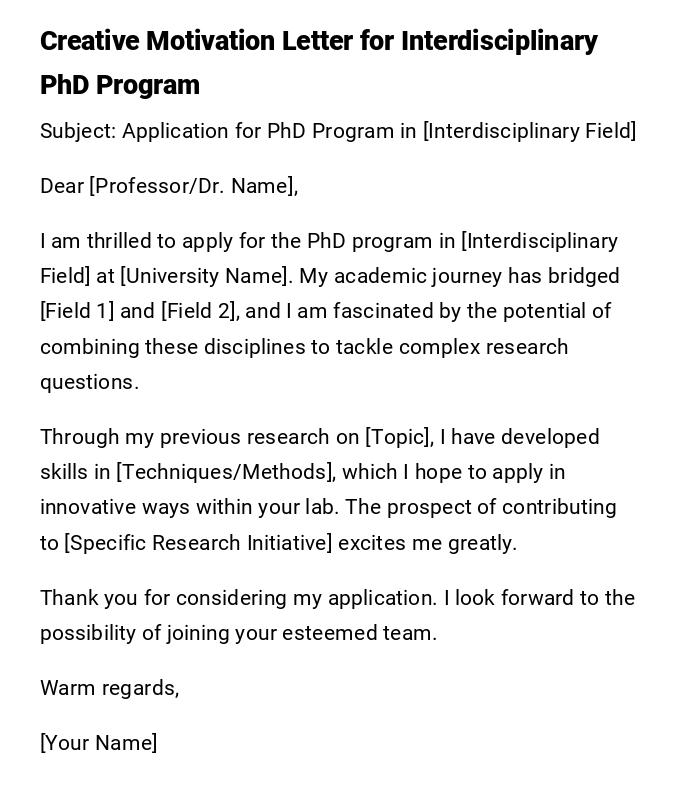
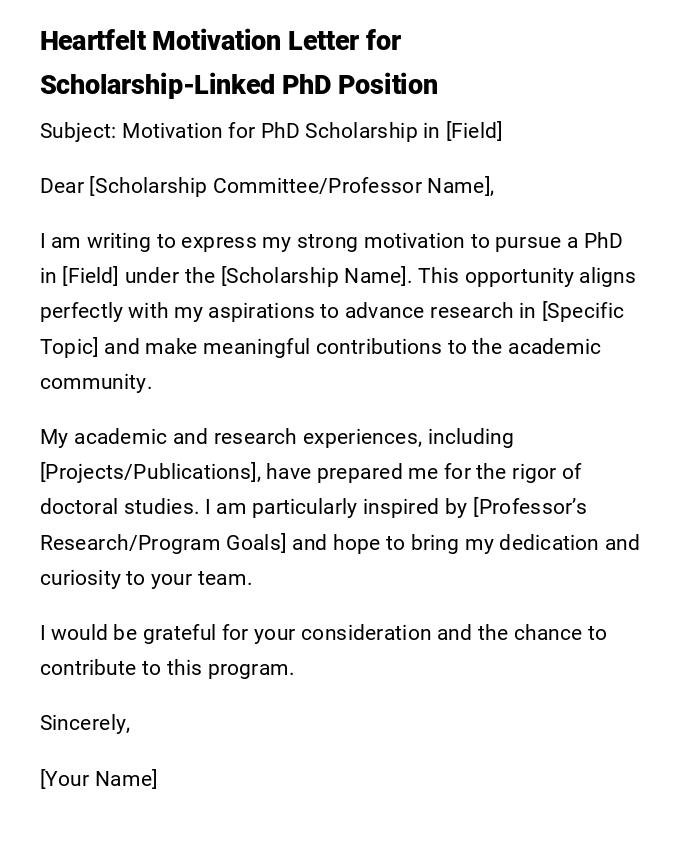
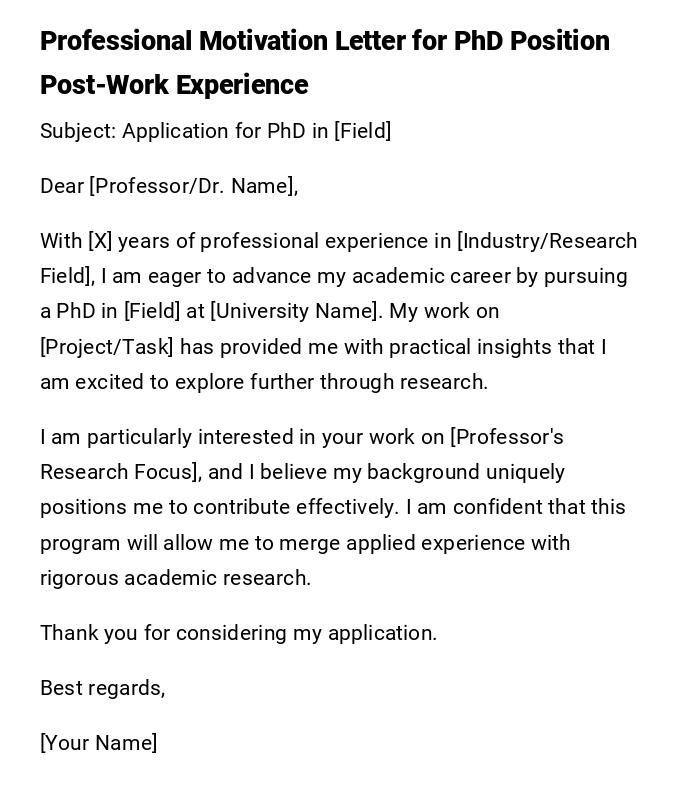
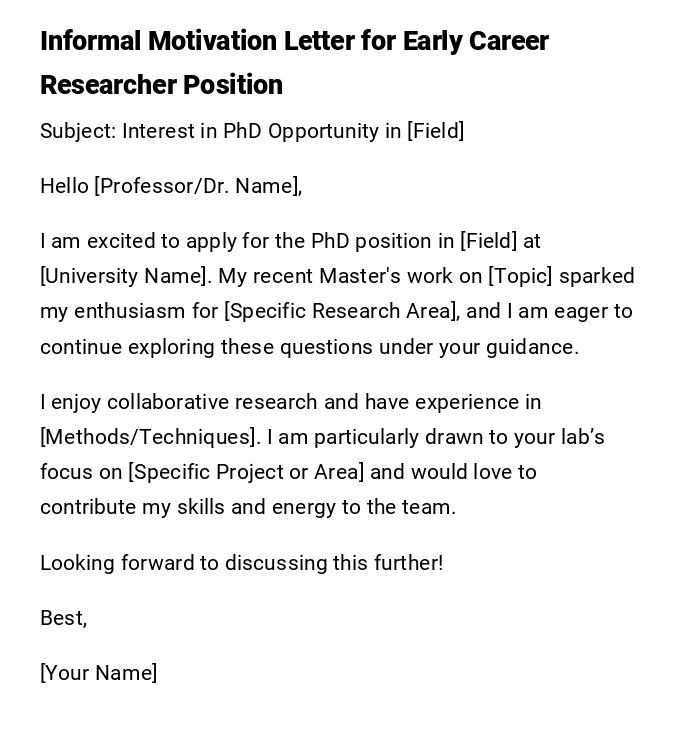
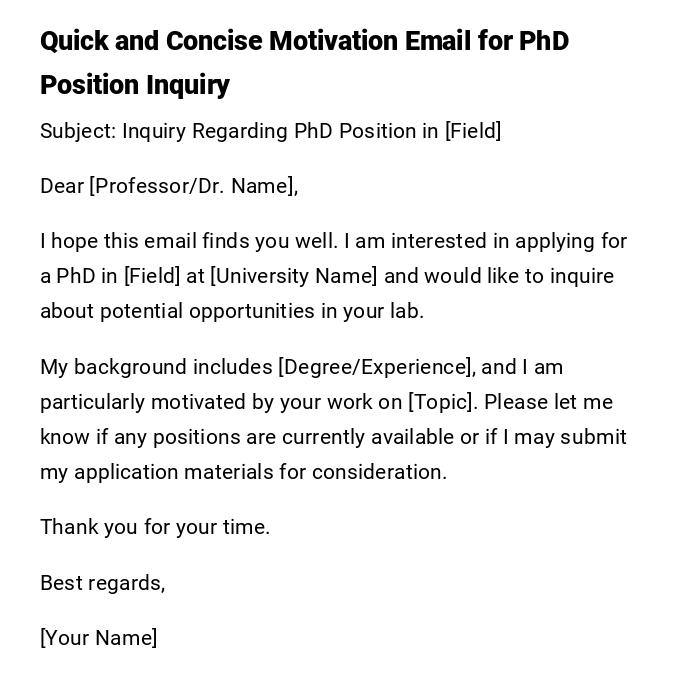
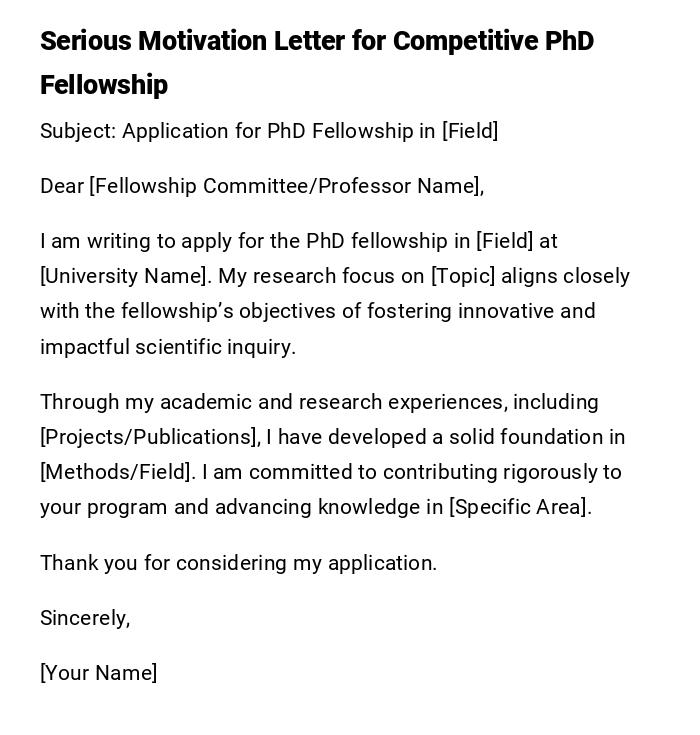

 Download Word Doc
Download Word Doc
 Download PDF
Download PDF